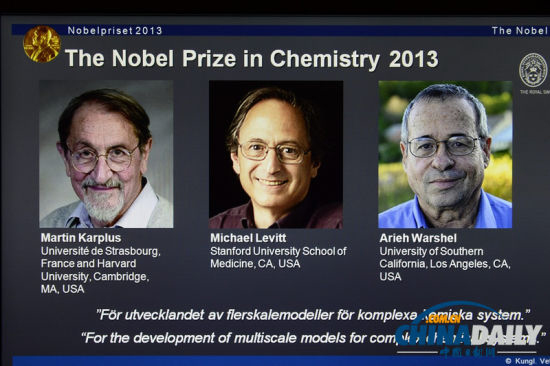US trio wins Nobel chemistry prize
中国日报网 2013-10-10 11:25

Three US scientists won the Nobel Prize in Chemistry on Wednesday for pioneering work on computer programs that simulate complex chemical processes and have accelerated progress in areas as diverse as drugs and solar energy.
The Royal Swedish Academy of Sciences, awarding the prize of 8 million kronor ($1.24 million) to Martin Karplus, Michael Levitt and Arieh Warshel, said their work has effectively taken chemistry into cyberspace. Gone are the days of modeling reactions using plastic balls and sticks.
"Today the computer is just as important a tool for chemists as the test tube," the academy said in a statement.
"Computer models mirroring real life have become crucial for most advances made in chemistry today.
"Chemical reactions occur at lightning speed; electrons jump between atomic nuclei, hidden from the prying eyes of scientists," the academy added.
In drug design, for example, researchers can now use computers to calculate how an experimental medicine will react with a particular target protein in the body by working out the interplay of atoms.
But the approach also has applications in industrial processes, such as the design of solar cells or catalysts used in cars.
Ultimately, the ability to computerize such complex chemical processes might make it possible to simulate a complete living organism at the molecular level - something Levitt has described as one of his dreams.
Warshel, talking about the use of computer programs, told reporters in Stockholm by phone link: "It's like seeing a watch and wondering how it actually works.
"You can use it to design drugs, or in my case, to satisfy your curiosity."
Karplus, a US and Austrian citizen, carries out research at the University of Strasbourg and Harvard University. Levitt, a US and British citizen, is at Stanford University School of Medicine.
Warshel, a US and Israeli citizen, is a professor at the University of Southern California, Los Angeles.
"It has revolutionized chemistry," Kersti Hermansson, a professor in organic chemistry at Uppsala University, said of the computer modeling.
"When you solve equations on the computer, you obtain information that is of such detail it is almost impossible to get it from any other method. ... You can really follow like a movie, in time and in space. This is fantastic detail.
"With that knowledge you can solve problems, determine why things happen - energy problems, corrosion, chemical reactions, materials, why the properties are how they are and how you could improve them to design better materials."
(中国日报网英语点津 丹妮 编辑)

About the broadcaster:

Lance Crayon is a videographer and editor with China Daily. Since living in Beijing he has worked for China Radio International (CRI) and Global Times. Before moving to China he worked in the film industry in Los Angeles as a talent agent and producer. He has a B.A. in English from the University of Texas at Arlington.


















 英语点津微信
英语点津微信 双语小程序
双语小程序